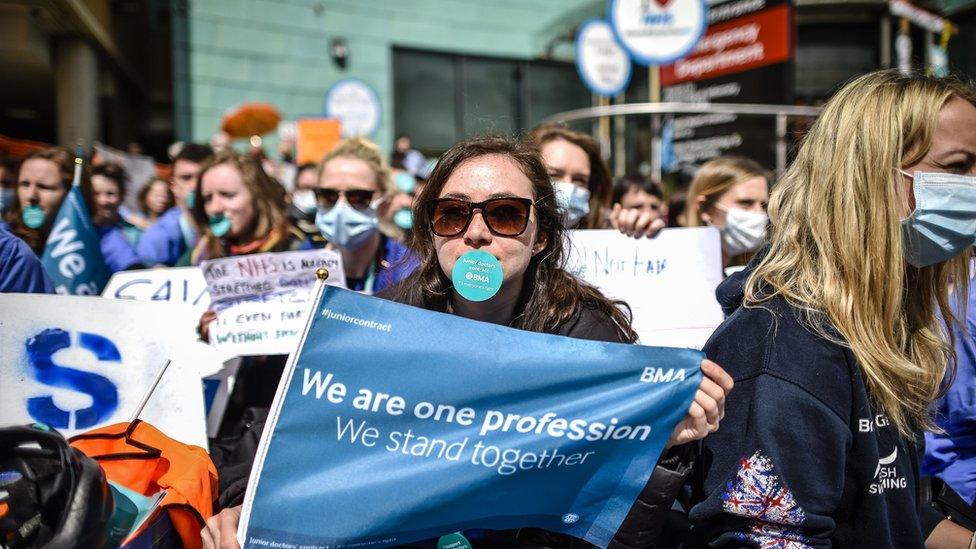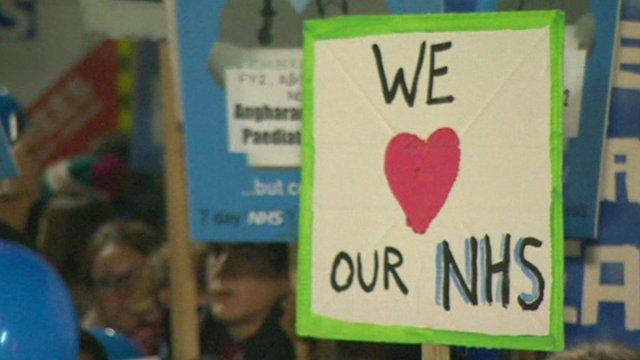Hospital death data - the row heats up
- Published

There has been an intense war of words throughout the junior doctors contract row in England.
But unlike previous disputes between the government and the public sector, some of the most acrimonious exchanges have come over statistics.
Doctors by definition are experts on assessing evidence and data and coming to rigorously worked out conclusions.
They have been quick to forensically analyse and challenge any arguments by ministers based on statistics. Nowhere has more heat been generated than in the debate over the so-called "weekend effect" in the NHS and whether patients receive inferior care on Saturdays and Sundays compared to weekdays.
Ever since the row over junior doctor contracts first flared up last autumn, ministers have pointed to research suggesting higher death rates after admission to hospital at weekends. This, they claim, highlights why more doctors are needed in hospitals on Saturdays and Sundays.
This has been rebutted by junior doctors who say they already work at weekends.
The issue rose rapidly up the agenda after the publication in the British Medical Journal (BMJ) of a study last September by Prof Nick Freemantle of University College, London and other academics.
It covered patient data on deaths within 30 days of hospital admission in England in 2013/14. It suggests there were 11,000 excess deaths between Friday and Monday compared to mid-week.
For Saturday admissions, there was a 10% higher risk of death than those on a Wednesday - and for Sunday a 15% higher risk. The study adjusts for the fact that patients tend to be sicker at weekends.
Sicker patients
The study became a political football, much to the irritation of the authors who argued it was a statistical analysis and they were not attempting to draw firm conclusions on whether hospital staffing was a factor in higher weekend death rates.
Junior doctors have consistently criticised ministers' use of the study to back up their rhetoric over a seven day NHS.
Now a new study on weekend death rates has been published and junior doctors highlighted it.

Junior doctors are fighting against the imposition of a new contract
The research by the University of Manchester, published in the Journal of Health Services Research and Policy, concluded that those attending A&E (as opposed to those actually admitted to a hospital bed) at weekends were no more likely to die than those arriving during the week.
The Manchester study showed that those who were unwell enough to be admitted to hospital did have a higher chance of death within 30 days if this happened at a weekend.
But they point out the percentage rate was higher simply because it was calculated from a total number of admissions which was lower than during the week.
The authors say in effect there is a higher bar for admission at weekends.
Like the research for the BMJ, the Manchester work also took account of the fact that patients who arrive on Saturdays and Sundays are usually sicker.
Claims and counter-claims
There are differences between what the two studies analysed.
The Manchester research looked at patients who died in hospital (including those who had been discharged and then had to go back to hospital).
The BMJ work included those who were discharged and died away from the hospital.
The Manchester piece included the sickest patients who died within three days of getting to hospital while the BMJ research did not.
The Manchester work spanned 11 months of data, the BMJ article covered 12 months.
Both articles used Hospital Episode Statistics (known as HES) covering hospital patient data. Some have questioned whether this data is collected consistently and robustly across all hospitals in England.
So what are we to conclude? Articles with different methodologies can come to differing results. The use of statistics in a highly charged dispute can lead to misleading claims and counter-claims.
The government and NHS England believe there is a "weekend effect". What is still far from clear is what the underlying causes of that are.
- Published27 April 2016
- Published6 April 2016

- Published1 December 2015
